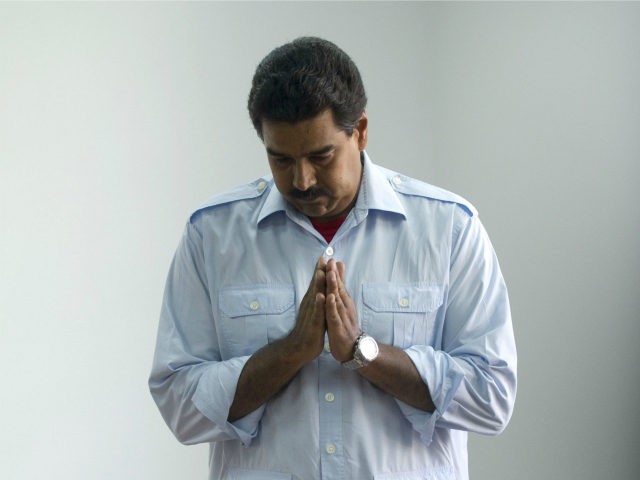The Russian Foreign Ministry announced Friday that its chief, Sergey Lavrov, will travel to China next week for discussions with diplomats there. Topics will include how to issue a united response to the chaotic political situation in Venezuela.
Russia is the most vocal supporter on the world stage of socialist dictator Nicolás Maduro, who ceased to be the nation’s head of state in January following the inauguration of Interim President Juan Guaidó. As Maduro still controls the nation’s military, he has used this as leverage to keep Guaidó out of the presidential palace and retain support from key international allies.
Chinese officials have not taken as openly supportive a stance as Russia, refusing to call Maduro the legitimate president of Venezuela. As Beijing has invested billions in Venezuela’s socialist economy, however, it has denounced any U.S. presence or support for a transitional Venezuelan government and emphasized that whoever emerges the victor in that country is not to maintain friendly relations with the West.
Russian Foreign Ministry spokeswoman Maria Zakharova confirmed the Lavrov trip Friday, noting that Venezuela would be among the topics on which both sides coordinated.
“The ministers will discuss ways to boost coordination on the international stage,” Zakharova told reporters. “In addition, they will also touch upon pressing global issues, including arms control, the situation in Venezuela, the North Korea issue, the Syrian crisis and the situation in Afghanistan.”
The larger goal of the visit to China, according to the spokeswoman, will be cooperation “on major political events expected to take place later in the year.”
Zakharova used her press conference on Thursday to further the Russian position on Venezuela as well, accusing the United States of attempting to promote violence in the country through an elaborate conspiracy to provide weapons to the Venezuelan opposition involving Ukraine, which is currently suffering years of Russian invasion.
“We have information that companies from the US and its NATO allies are considering the possibility of buying a large batch of weapons in one of Eastern European countries in order to provide them to the Venezuelan opposition,” Zakharova claimed. “The batch will reportedly include heavy machine guns, grenade launchers, portable missile launchers and ammunition for light weapons and artillery systems. So this is what they mean when they talk about delivering humanitarian aid.”
The Chinese Communist Party has yet to issue remarks on the upcoming talks with Russia. The Foreign Ministry did remark on Venezuela on Friday, backing Maduro’s rejection of humanitarian aid for his citizens.
“If so-called aid material is forced into Venezuela, and then if it causes violence and clashes, it will have serious consequences. This is not something anyone wants to see,” spokesman Geng Shuang told reporters. “China opposes military intervention in Venezuela, and opposes any actions causing tensions or even unrest.”
Geng also praised Maduro’s forces for “exercising restraint,” failing to mention that the military has attacked humanitarian aid convoys, culminating in a deadly incident on the Brazilian border Thursday night.
China’s warnings of a “military intervention” in Venezuela, of which there is no evidence of being planned or occurring in the near future, have been consistent, particularly targeting the United States. Shortly after Guaidó’s inauguration, Chinese Foreign Ministry spokeswoman Hua Chunying issued remarks demanding a “political solution” to tensions between Maduro’s illegitimate regime and the rest of the country.
“China supports the efforts made by the Venezuelan government to uphold national sovereignty, independence and stability. China always upholds the principle of non-interference in other counties’ internal affairs and opposes foreign interference in Venezuela’s affairs,” Hua said.
Unlike the Russian government, Hua refused to answer definitively when asked if, following the assumption of Guaidó, Maduro still remained president. China’s reluctance to personally support Maduro has led many to question if Guaidó, a founding member of the socialist Popular Will party, could convince Beijing to switch allegiances.
The Asian current events outlet The Diplomat noted that China has withdrawn support for ideological allies when they lose power, like dictator Robert Mugabe in Zimbabwe and Muammar Qaddafi in Libya. “China changes its foreign policy when it realizes that a government is failing to govern,” the publication concluded. “It has acknowledged and prepared for a loss in Venezuela, so even a discounted deal with the new government is better than a bottomless pit.”
Maduro’s regime relies heavily on China to survive. In September, the dictator announced a deal that would bring $5 billion into his government’s coffers from China in exchange for consistent payments in oil. Maduro has largely failed to pay on similar deals with Russia and Cuba as the state oil company, Petróleos de Venezuela (PDVSA), has seen a steep drop in production during his tenure. Maduro replaced most PDVSA officials with cronies who had no experience in the oil trade, leaving no institutional memory or strategy for running the company in place.
Guaidó, noting that both China and Russia have financial concerns regarding the regime, has reached out and warned that upon the collapse of what remains of the Maduro regime, they may lose all of their investments.
With Russia, Maduro has responded by expressing interest in granting the Russian military access to its territory, giving Moscow an unprecedented foothold in the Caribbean Sea.

COMMENTS
Please let us know if you're having issues with commenting.